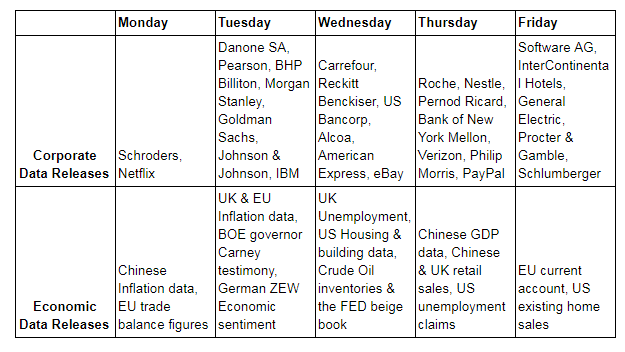Synopsis of the week
- Last week saw both the DAX and the S&P500 setting higher highs as bond markets continue to prove volatile due to rate uncertainty, equities still appear as the most attractive destination for funds.
- Chinese September import data jumps higher adding to enthusiasm for its manufacturing and construction sectors, a sentiment which has been steadily improving throughout 2017.
- At its bi-annual meeting, the International Monetary Fund found its US host was the most vocal in calling for a structural change to its lending schemes. A focus on reforms aimed at driving private sector economic growth such as tax cuts and a reduction in administrative red tape being the focus. The single biggest loser in these US suggested changes would be China.
Press Coverage
On Thursday evening, Alastair McCaig Director of Investment Management at Fern Wealth joined Bloomberg host Jonathan Ferro and Paul Dobson. The discussion covered Michel Barnier’s negative comments on how little progress had been made in Brexit talks, the latest developments in Catalonia and the race to become the next US FED chairman.
Click here to listen to the interview on Bloomberg
On Wednesday I went to Bloomberg’s “Swiss Day” conference in Zurich. Of the many topics that were discussed throughout the day three specifics were most prominent in conversations. Central bank interest rate policies, the strength of global equity markets and the Swiss Franc.
The keynote speaker was Charles L Evans, President of the Federal Reserve Bank of Chicago and a member of the US FOMC. Mr Evans is one of nine current members whose votes decide if the US changes its interest rate. Stability and confidence were two of the keywords he mentioned on several occasions, the importance of the markets believing the FOMC was essential to economic stability. Nothing that was discussed would have changed economists opinions that another US rate rise is on the horizon over the last quarter of 2017.
Several major equity markets are at all-time highs and share traders are currently enjoying strong bullish momentum. Panel discussions with the heads of JP Morgan, UBS and GAM’s Investment banking arms were all of the opinion that this would continue to the end of the year. The consensus was that with many of the political issues having been resolved in the EU, Europe was still the most attractive destination for funds. The biggest issue that might alter this current opinion would be a sharp increase in the pace of US tax reforms and regulatory oversight.
The Swiss National Bank is one of the few central banks who are not looking at the long-term rate normalisation. The panel was again all in agreement that the Swiss Franc is overvalued, a divergence of opinion, however, appeared as to how high EUR/CHF might go should it break above the 1.2000 level (where the SNB had previously pegged it). We have been stating our house opinion that a return to levels above 1.2000 was on the cards over the next year. It is also worth noting that the EUR/CHF spent the previous three years being range bound between 1.2000 and 1.2600
Wednesday will mark the start of the 19th National Congress of the Communist Party of China, in the five years since the last congress, Chinese GDP has grown on average by 7.2% in comparison to the 2.6% average global growth rate. In that same time, disposable income of Chinese residents increased by 3.25 times. Last year the Chinese GDP of $11.2 trillion accounted for almost 15% of the world’s economy. Although this congress will have heavy political overtones it will also outline the targets that China will have for the next five years. Western manufacturers, service providers and commodity companies will all be watching closely.
The latest EU summit in Brussels on Thursday will see discussions focusing on Brexit following Michel Barnier’s comments “ We have reached a state of deadlock” as the fifth round of discussions come to an end without even the pretence that progress is being made.


